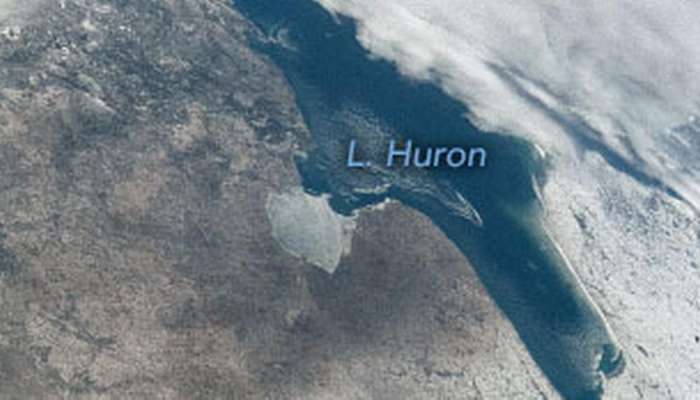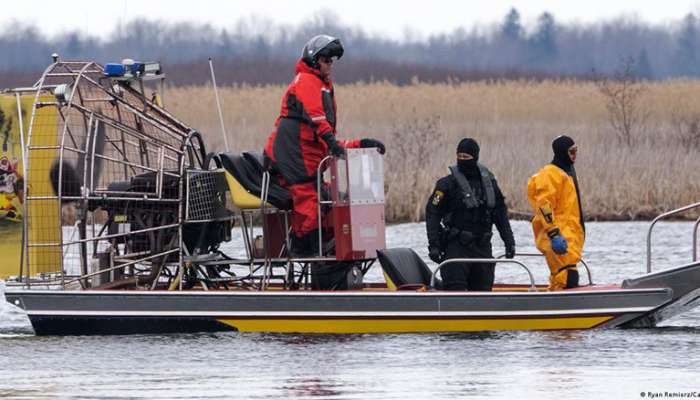

New Delhi: Authorities announced last week that the four bodies recovered from the St. Lawrence River in Akwesasne, a Mohawk reserve wedged between the Canada-US border, were of people who came from a village in the Mehsana district of Gujarat, in western India.
The family of four, Praveen Chaudhary, 50, his wife Diksha, 45, and their children, Vidhi, 23, and Mitkumar, 20, attempted to enter the US from Canada by boat across the St. Lawrence River, police said. They are believed to have reached Canada on a tourist visa in February.
Eight bodies in total were recovered last Thursday and Friday in Tsi Snaihne in Akwesasne. The other group of four deceased migrants was identified as a family from Romania.
Investigators said they now suspect a young couple and their child from Mansa in Gandhinagar, Gujarat, were also with the Chaudharys on the boat.
"Many fall prey to illegal immigration rackets. These trafficking syndicates lure them with promises and charge hefty sums. We had busted quite a few but new ones keep cropping up," Gujarat's former director of police, Ashish Bhatia, told DW.
The Gujarat government is mulling whether to introduce legislation to go against smugglers who pose as travel agents to lure vulnerable people. However, officials say this would take time.
"Can you imagine the number of people who have managed to cross over? What we know are instances of people who die or are detained by foreign immigration and border police. It is the most lucrative trade and people are willing to chance it," a senior intelligence official, who requested anonymity, told DW.
Human smuggling networks deliver false promises
The latest tragedy echoes the case of the Patel family from the Kalol district of Gandhinagar. The family of four froze to death in southern Manitoba in January last year, while allegedly attempting to illegally cross over to the US.
They were reportedly separated in a blizzard from a larger group of Indian nationals who managed to cross over in sub-zero temperatures.
"We arrested two travel agents in connection with the Patel incident. The agents had sent 11 persons, including the Patel family, to illegally enter the USA. They were responsible for arranging the Indian side of the travel and informing the group of whom they would meet up with in the USA once they crossed the border," Deputy Commissioner of Police (Crime) Chaitanya Mandalik told DW.
In December last year, another Gujarat resident, Brijkumar Yadav, died while scaling the Mexico-US border wall with his wife and three-year-old son along with a larger group of migrants attempting to cross the border point between San Diego and Tijuana, Mexico.
Tijuana Police said that Yadav and his son fell from scaling the wall onto the Mexican side, while his wife landed on US territory.
The incidents have put a spotlight on human smuggling operations involving Indian migrants, especially from Gujarat, using Canada and Mexico as transit points.
Human smugglers make false promises about easy escapes, without providing warnings about the risks involved.
Gujarat police probing human smuggling cases said smugglers receive help from Punjabi counterparts to facilitate illegal entry into the US.
"From the initial interrogation of agents we have arrested, they charge $70,000-$75,000 (€64,000- €69,000) for each individual. The agents usually map the road to the US via Canada or through the Turkey-Mexico route," said Mandalik.
The US Census Bureau data estimates that around 587,000 undocumented Indian immigrants currently live in the US.
What's driving Gujaratis to migrate?
Thousands from Gujarat's Patidar or Patel community have tried to undertake precarious journeys through dense forests, deserts and risky water channels to reach the US in search of better lives and the "American dream."
"The rush to escape is strong. People here are willing to spend any amount of money to somehow reach the US where the large and powerful network of the Patel community takes care of them," sociologist Gaurang Jani, who teaches at the Gujarat University in Ahmedabad, told DW.
"Once they have reached their destination, there is a huge support structure from the community. They do not mind taking on menial jobs but the goal is to reach the US," added Jani.
In March 2022, six youths from Gujarat were not so lucky when US border authorities arrested the group after their boat sank in the Saint Regis River, close to the border with Canada. They were trying to enter the US illegally, authorities claimed.
Police are still on the lookout for Charanjit Singh, one of the alleged architects behind the human smuggling network between India and countries including the US and Canada. He is said to have fled to the US from India in January last year, is a US citizen and possesses two passports.
Singh mostly operated out of Delhi, and is reported to have left India after the authorities started probing human smugglers operating in Gujarat and beyond.
Singh's former associate, Bharat "Bobby" Patel, was taken into police custody last year. He was found in possession of 55 fake passports of different individuals.
"We have notified authorities in the US. Charanjit also runs motels in the US and has contacts who help him traffic people in Nigeria, Turkey, Mexico and Canada," said Gujarat's former director of police Bhatia.